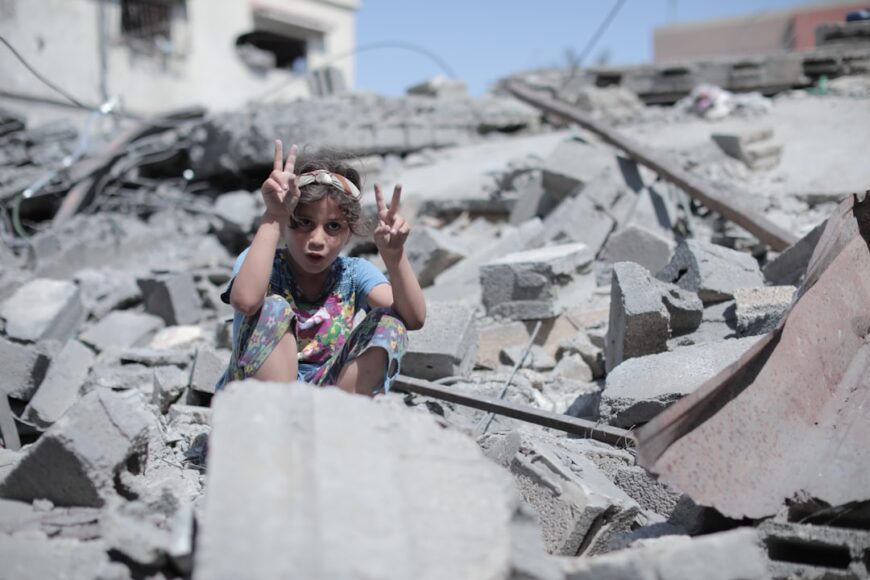
Gaza, a small strip of land located on the eastern coast of the Mediterranean Sea, has been a hotbed of conflict and turmoil for decades. Currently, the region is facing a dire humanitarian crisis, with high unemployment rates, limited access to basic services such as healthcare and clean water, and a lack of infrastructure. The ongoing Israeli-Palestinian conflict has exacerbated these issues, leaving the people of Gaza trapped in a cycle of poverty and despair.
It is crucial to discuss Gaza’s future prospects because finding a sustainable solution to the challenges facing the region is not only essential for the well-being of its residents but also for regional stability. Without addressing the root causes of the conflict and implementing long-term solutions, Gaza will continue to be plagued by violence and instability.
The Historical Context of Gaza’s Turmoil
To understand the current situation in Gaza, it is important to examine its historical context. The conflict between Israel and Palestine dates back to the mid-20th century when Israel was established as a state, leading to the displacement of hundreds of thousands of Palestinians. Gaza, which was under Egyptian control at the time, became a refuge for many Palestinian refugees.
In 1967, Israel occupied Gaza during the Six-Day War, marking the beginning of a long and tumultuous relationship between Israel and Gaza. Since then, there have been several conflicts between Israel and Hamas, the militant group that governs Gaza. These conflicts have resulted in significant loss of life and destruction in the region.
Furthermore, colonialism and imperialism have played a significant role in shaping Gaza’s current situation. The British Mandate over Palestine from 1920 to 1948 laid the groundwork for the establishment of Israel and contributed to the displacement of Palestinians. The subsequent Israeli occupation and control over Gaza have further exacerbated tensions and hindered development in the region.
The Role of International Actors in Gaza’s Future
International actors, such as the United Nations and other international organizations, play a crucial role in shaping Gaza’s future. The United Nations Relief and Works Agency for Palestine Refugees in the Near East (UNRWA) provides essential services to Palestinian refugees in Gaza, including education, healthcare, and social services. However, due to funding shortages and political challenges, UNRWA’s ability to meet the needs of the population is limited.
Foreign aid also plays a significant role in Gaza’s development. Donor countries and organizations provide financial assistance to support infrastructure projects, healthcare services, and humanitarian aid. However, the effectiveness of foreign aid in Gaza is often hindered by political considerations and restrictions imposed by Israel.
The Importance of Economic Development in Gaza
Economic development is crucial for improving the lives of people in Gaza and creating a sustainable future for the region. The high unemployment rates in Gaza, particularly among young people, contribute to poverty and despair. Creating job opportunities and promoting economic growth can help alleviate these issues.
Gaza has untapped potential for economic growth, particularly in sectors such as agriculture, tourism, and renewable energy. The region has fertile land that can be utilized for agricultural purposes, and its location on the Mediterranean coast makes it an attractive destination for tourists. Additionally, investing in renewable energy can help address the chronic electricity shortages in Gaza.
However, economic development in Gaza faces numerous challenges. The Israeli blockade restricts the movement of goods and people, hindering trade and investment opportunities. Additionally, the ongoing conflict between Israel and Hamas creates an unstable environment that discourages foreign investment.
Education and Youth Empowerment in Gaza
Education plays a crucial role in shaping Gaza’s future. Access to quality education is essential for empowering young people and equipping them with the skills they need to succeed. However, the education system in Gaza faces numerous challenges, including overcrowded classrooms, a lack of resources, and limited access to higher education.
Investing in education and empowering young people in Gaza can have a transformative impact on the region. By providing quality education and vocational training, young people can acquire the skills they need to contribute to the development of Gaza. Additionally, empowering youth can help counter radicalization and extremism, promoting peace and stability in the region.
The Role of Women in Gaza’s Future
Women’s rights and empowerment are crucial for Gaza’s future. Women in Gaza face numerous challenges, including limited access to education, high rates of unemployment, and gender-based violence. However, women also play a vital role in the social, economic, and political development of the region.
Promoting women’s rights and empowering women in Gaza can have a transformative impact on the region. By ensuring equal access to education and economic opportunities, women can contribute to the development of Gaza and break the cycle of poverty. Additionally, empowering women can lead to more inclusive and representative governance, promoting stability and peace in the region.
Gaza’s Political Landscape and Prospects for Change
The current political situation in Gaza is complex and fragmented. Hamas, an Islamist militant group, has been in control of Gaza since 2007 when it ousted the Palestinian Authority. The division between Hamas and the Palestinian Authority has hindered political progress and reconciliation efforts.
However, there is potential for political change in Gaza. The recent elections in Palestine have provided an opportunity for renewed dialogue and reconciliation between Hamas and the Palestinian Authority. Additionally, international pressure and diplomatic efforts can help facilitate a peaceful resolution to the conflict.
The Role of Civil Society in Gaza’s Future
Civil society plays a crucial role in shaping Gaza’s future. Non-governmental organizations (NGOs), community-based organizations, and grassroots movements are essential for advocating for human rights, promoting social justice, and driving positive change in the region.
Civil society organizations in Gaza work tirelessly to provide essential services, advocate for the rights of marginalized groups, and promote peace and reconciliation. Their work is often challenging due to restrictions imposed by the Israeli blockade and political tensions. However, their resilience and determination are crucial for creating a better future for Gaza.
The Importance of Reconciliation and Unity in Gaza
Reconciliation and unity are essential for Gaza’s future. The division between Hamas and the Palestinian Authority has hindered political progress and development in the region. Reconciliation efforts are crucial for creating a unified Palestinian front and establishing a stable and representative government.
Additionally, unity among Palestinians is essential for addressing the root causes of the conflict with Israel. By presenting a united front, Palestinians can negotiate from a position of strength and advocate for their rights effectively.
Hope for Gaza’s Future
Despite the challenges facing Gaza, there is hope for a better future. By addressing the root causes of the conflict, investing in economic development, empowering youth and women, promoting political reconciliation, and supporting civil society organizations, positive change can be achieved.
It is crucial for international actors to continue supporting Gaza’s development and advocating for a just and lasting solution to the Israeli-Palestinian conflict. By working together, we can create a future where the people of Gaza can live in peace, prosperity, and dignity.













